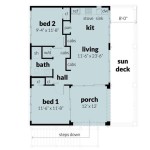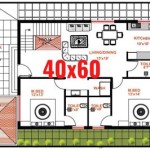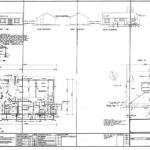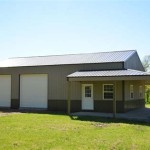## House Plans With A Basement A basement is a great way to add extra space to your home without having to build an addition. It can be used for a variety of purposes, such as a family room, a playroom, a home office, or a guest room. If you're thinking about adding a basement to your home, there are a few things you'll need to consider. The first thing you'll need to do is decide what you want to use the basement for. This will help you determine how much space you need and what kind of layout you'll want. Once you know what you want to use the basement for, you can start planning the layout. The next thing you'll need to do is decide how you're going to finish the basement. There are a variety of options available, so you'll need to choose the one that's right for you. If you're on a budget, you may want to consider finishing the basement yourself. However, if you don't have the time or the skills, you can hire a contractor to do it for you. Once you've finished planning the layout and the finishes, you can start building the basement. This is a complex process, so it's important to hire a qualified contractor to do the work. The contractor will be able to ensure that the basement is built to code and that it's safe and habitable.
Here are some of the benefits of having a basement:
* **Extra space:** A basement can provide you with extra space for a variety of purposes. You can use it for a family room, a playroom, a home office, or a guest room. * **Increased value:** A basement can increase the value of your home. This is because it adds extra square footage to your home, which is a valuable commodity in the real estate market. * **Protection from the elements:** A basement can provide protection from the elements, such as storms, floods, and tornadoes. This can be a valuable asset in areas that are prone to severe weather. * **Energy efficiency:** A basement can help to make your home more energy efficient. This is because it provides an extra layer of insulation between your home and the outside air.Here are some of the things to consider when planning a basement:
* **Size:** The size of your basement will depend on how you plan to use it. If you want to use it for a family room or a playroom, you'll need a larger basement than if you want to use it for a home office or a guest room. * **Layout:** The layout of your basement will depend on how you plan to use it. If you want to use it for a family room, you'll need to include a seating area, a TV area, and possibly a fireplace. If you want to use it for a playroom, you'll need to include a play area, a storage area, and possibly a bathroom. * **Finishes:** The finishes you choose for your basement will depend on your personal taste and budget. There are a variety of options available, including drywall, paneling, and carpeting. * **Budget:** The cost of building a basement will vary depending on the size, layout, and finishes you choose. It's important to set a budget before you start planning your basement so that you don't overspend. If you're thinking about adding a basement to your home, there are a few things you'll need to consider. By following these tips, you can plan and build a basement that meets your needs and fits your budget.
Simple House Floor Plans 3 Bedroom 1 Story With Basement Home Design 1661 Sf Basementdesignflo One New

House Plans With Basements Dfd Blog

Versatile Spacious House Plans With Basements Houseplans Blog Com

Stylish And Smart 2 Story House Plans With Basements Houseplans Blog Com

Basement House Plans Next Level Homes

Photos Of Plan 1117 The Clarkson Basement Floor Plans House

Hillside House Plan Modern Daylight Home Design With Basement

Don Gardner Walkout Basement House Plans Blog Eplans Com

Small Cottage Plan With Walkout Basement Floor

Extend Your Homes Living Space With A Basement Floor Plan








